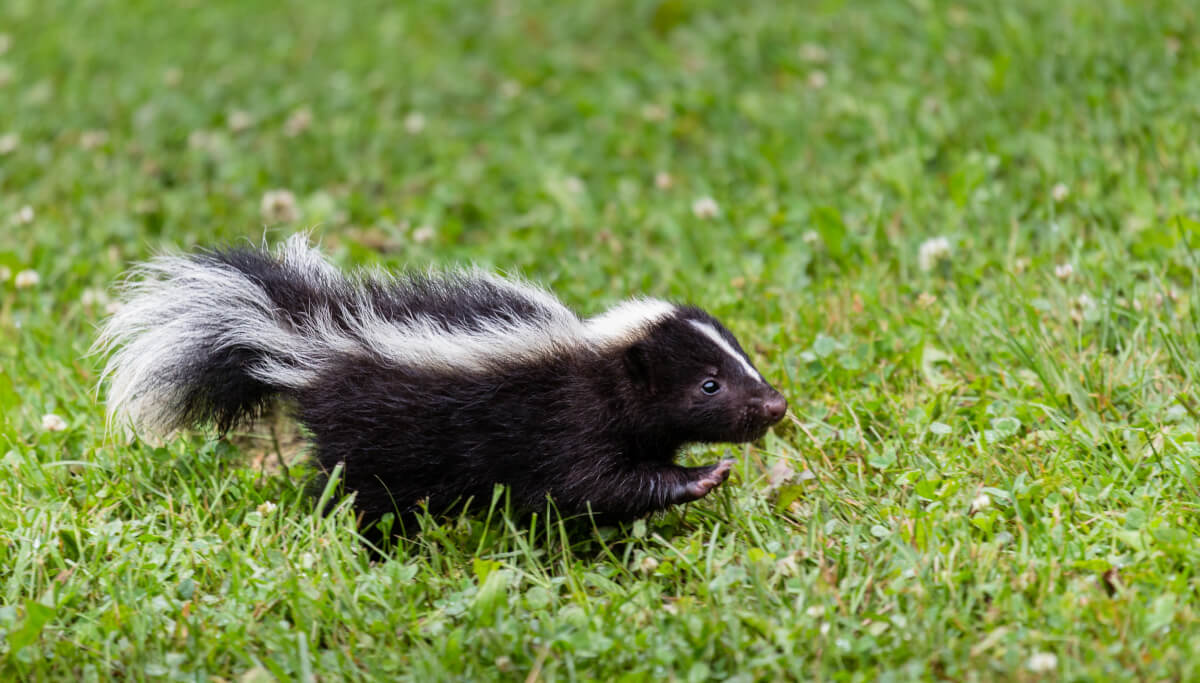Skunks can be found in most parts of the U.S., southern Canada and northern Mexico, which means you’re likely to go face-to-snout with this scavenger if you spend much time in the woods. Though mostly nocturnal and timid, skunks can be a nuisance. They’ll use their sharp burrowing claws to dig holes in your lawn, break through doors and tear through tents, or even burrow under your home and weaken its very foundation – all in its search for food.
But that’s not even the worst thing about these pesky critters; if you’re unlucky enough to startle or scare one, they’ll spray you with tear-inducing musk from glands near their anus: the infamous skunk stink. The smell is indescribably eye-watering, nauseating and can’t be removed with ordinary soap or shampoo. It’s imperative that you know how to deal with this disgusting scent in case you, your pets or family members have the misfortune of getting sprayed, either at home or during an outdoor trip.

The tomato juice cure and other myths
Contrary to popular belief, soaking the victim in a tub filled with tomato juice does nothing to remove the smell. You will only waste time, effort and perfectly good fixings for a Bloody Mary. All you’ll do is endow your now-pungent victim with a tomato-scented skunk odor.
Other myths include bathing in or spraying lemon juice on the affected area, or putting on perfume or any other sweet-smelling scent to remove or mask the odor. Like the tomato juice, you’ll only make the stink more “exotic” without lessening or getting rid of it.
The real deal
If you or the victim wants to be accepted by the human race ever again, get rid of the odor by concocting a special “shampoo” with these ingredients:
- 1 quart 3% hydrogen peroxide (don’t use higher concentrations as these are harmful)
- ¼ cup baking soda
- 1 teaspoon liquid handwashing soap (dish detergent also works)
Once you’ve mixed the ingredients above, bathe the victim. Scrub him or her thoroughly, then let the “shampoo” stay on for 5 minutes, rinsing afterwards.
Skunk spray is an oily secretion that clings, so you might have to repeat this process a few times until the smell washes off. Note that this mixture is highly volatile (as in explosive). Don’t keep any leftover “shampoo” in a closed container; pressure buildup will trap the resulting gases and cause the container to explode. If you have the added misfortune of getting sprayed in the eyes, wash out the musk with running water.

Take precautions
As the saying goes, “An ounce of prevention is worth a pound of cure”. To prevent you and your family members or pets from getting sprayed, take measures to avoid encountering skunks entirely. Here’s what you can do to keep those pesky varmints away:
- Keep in mind that skunks love to scavenge, and they love to explore trash. If camping out or living off-grid, dispose of all your food leftovers properly.
- If your campsite has edible fruits growing nearby, harvest and consume them immediately, and again, dispose of the peels, seeds and leftovers by putting them in a bin that can be sealed and locked to trap odors.
- You can also place your refuse in an airtight container and hang it at least 20 feet above ground. Skunks can’t jump or climb.
- You can use store-bought skunk repellent, or make your own. Mix one quart of water, half a jalapeno pepper and two tablespoons of cayenne pepper. Boil the mixture for 20 minutes and let cool. Spray this around the perimeter of your campsite each day.
- Alternatively, you can soak old t-shirts or rags in ammonia or vinegar. Ironically, skunks hate the smell of vinegar; if you place the vinegar-soaked rags about your camp every night, they’ll avoid it like the plague. Save the rags in a container in the morning and “refresh” the rags every now and then with a fresh sprinkling of vinegar.
- Ammonia is also an effective skunk repellent, but take care that none spills on any plants or grass since it can burn vegetation. Use only on rags or on bare ground.
- As nocturnal creatures, skunks hate light. You can also keep them at bay by hanging a lantern or other light source at your camp, but remember that you attract insects by doing so.
What to do when facing a skunk
Despite your best efforts, you may still encounter a skunk. When faced with one, stay still and don’t make any sudden moves. Never offer food or dare come near to “pet” a skunk, no matter how “cute” you think it to be. Skunks will take any movement towards them as an act of aggression, which will trigger their defensive stance.
You can tell they’re about to spray when their fur stands on end, they growl, stomp their front paws and turn their backside towards you and lift their tail. The second you see them look agitated, run in the other direction. Skunks can spray up to 15 feet, so you’d best not be caught in the blast zone!
Final notes
Skunks are like any other wild animal. They’re likely to be more scared of you than you are of them, and should be dealt with respectfully.
If you are camping or living off-grid, it’s best that you avoid attracting them and give them a wide berth. Stay away and keep your pets (especially dogs) away from them, as skunks have another deterrent besides their spray — they carry several dangerous diseases, which include:
- Rabies
- Leptospirosis
- Canine hepatitis
- Canine distemper
- Intestinal roundworms
As pesky as they may be, it’s not advised to kill a skunk. As a vital part of the ecosystem, they eat their share of pests like small rodents and insects. Keep your environs clean of trash and dispose of refuse properly, and you can coexist peacefully with these striped stink bombs.



